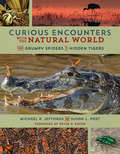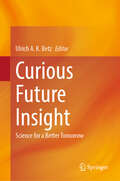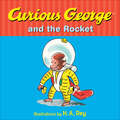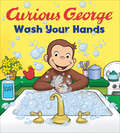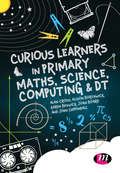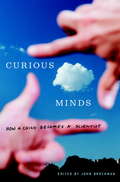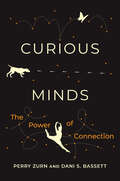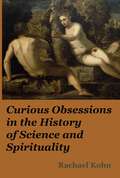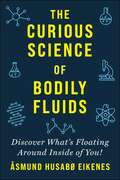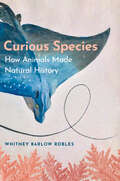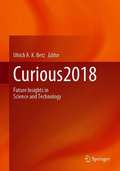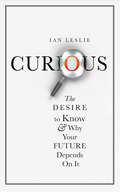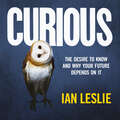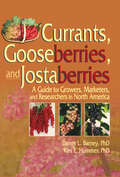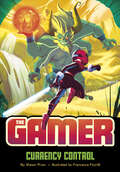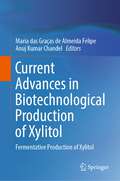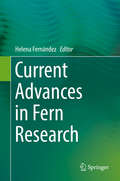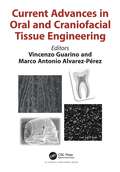- Table View
- List View
Curious Encounters with the Natural World: From Grumpy Spiders to Hidden Tigers
by Susan Post Michael JeffordsMichael R. Jeffords and Susan L. Post have circled the globe--and explored their neighborhood--collecting images of the natural world. This book opens their personal cabinet of curiosities to tell the stories of the pair's most unusual encounters. From the "necking" battles of mate-hungry giraffes to the breathtaking beauty of millions of monarch butterflies at rest, Jeffords and Post share 200 stunning photographs and their own insightful essays to guide readers on a spectacular journey. Their training as entomologists offers unique perspectives on surprise stag beetle swarms and spider hunting habits. Their photographic eye, honed by decades of observation, finds expression in once-in-a-lifetime images. The result is an eyewitness collection of startling and unusual phenomena that illuminates the diverse life inhabiting our planet.
Curious Future Insight: Science for a Better Tomorrow
by Ulrich A. K. BetzThis book follows up the debate on the future of science and technology at the Curious2022 – Future Insight Conference, the second event in this conference series initiated on the occasion of Merck’s 350th anniversary. In the chapters, some of the world’s top scientists, managers and entrepreneurs explore breakthrough technologies and how they can be applied to make a better world for humanity. The book begins with an introduction to the vision of the conference “United by science for a better tomorrow” and the impacts caused by the pandemic, highlighting the importance of gathering like-minded people to discuss and support the advancement of science and technology for the benefit of humanity. In the first part of the book, readers will also find a chapter written by the Executive Board of Merck KGaA discussing the importance of curiosity for innovation and an overview of the company’s contribution in the areas of life sciences, healthcare and electronics forward-moving the scientific discovery. The second part of the book offers insights of some of the scientific topics discussed at the conference, and particular attention is given to new therapies and sustainability. In the final part of the book, readers will find some thoughts on ethical principles guiding our application of science and technology to create a bright future for humanity, and diverse perspectives on topics such as health, life sciences, nutrition, material sciences, digitalization, AI, energy, mobility, space flight, robotics, the secrets of the human mind and new ways of working together. Given its interdisciplinary appeal, the book will inspire curiosity in a wide readership, from scholars and researchers to professionals with an interest in exploring the future of science and technology, solving the problems of today, and paving the way for a better tomorrow. Chapters 1 and 2 are available open access under a Creative Commons Attribution 4.0 International License via link.springer.com
Curious George Discovers Plants (Curious George)
by H. A. ReyGeorge's friend Chef Pisghetti makes the most delicious vegetable soup! When the chef is running low on fresh vegetables, George wants to lend a hand in the rooftop garden--but he has a lot to learn about greenery. Come along as George discovers all about gardening, plants, what makes them grow, and why they're important. Based on the Emmy-winning PBS show, this story is filled to the brim with additional facts, real photos, experiments, activities, and more. Learning about science has never been so much fun!
Curious George Discovers Recycling (Curious George)
by H. A. ReyCurious George wants to help clean up the planet, and recycling seems like a good place to start—but where does he begin? Follow along with George as he learns about what recycling is, how it works, and what else he can do to reduce his monkey paw print. Readers will learn the difference between recycling and trash, what happens to the things we throw away, and other ways to help keep our planet clean. Based on Curious George, the Emmy Award-winning PBS TV show, this story also includes fun facts, real photos, experiments, activities, and more. Learning about science has never been so much fun!
Curious George Discovers Space (Curious George)
by H.A. ReyCurious George embarks on an out-of-this world adventure and lends some helping hands—and feet—to save the space station astronauts. George is thrilled to visit the Space Center to help Professor Pizza and Professor Einstein. First up, he&’s making a special delivery to the international space station. Then it&’s time to help solve a problem with the Mars rover, and George dreams of going where no monkey (or human) has gone before—Mars! Join George on an exciting journey into outer space and learn all about space travel, gravity, the solar system, and Mars. Based on the Emmy-winning PBS show, this story is filled to the brim with additional facts, real photos, experiments, activities, and more. Learning about science has never been so much fun!
Curious George Discovers the Seasons
by H. A. ReyThe seasons are changing and winter is closing in. George has toys for warm weather and toys for snowy weather—but what’s a monkey to do when winter days are just plain cold? When he decides to ignore the weather and play with his wading pool and bubbles, George learns some interesting things about weather, temperature, and freezing and melting. Learn all about the four seasons with your favorite monkey! Based on the Emmy-winning PBS show, this story is filled to the brim with additional facts, real photos, experiments, activities, and more. Learning about science has never been so much fun!
Curious George and the Kite (CGTV Reader)
by H. A. ReyCurious George loves a good windy day. There are many things he can practice flying-like a kite. Now if only he doesn't get too carried away! This early reader explores the concepts of flight and experimentation.
Curious George and the Rocket (Curious George Ser.)
by Margret ReyGeorge takes a giant leap for monkeykind when he gets suited up and blasts off into space in this out-of-this-world interplanetary adventure.This lively story captures George’s adventure of becoming the first space monkey from the classic Curious George Gets a Medal.Praise for the Curious George books“What distinguishes the George stories is where the trouble is—almost never in a person, never in humanity. George lives in a super benign world, even if it is often strange and unfamiliar to him. This is different than living in a world that is familiar but crowded with evil or indifference . . . George is at once an impossible monkey, a fantasy, and also, simply, one of us.” —The New Yorker“Curious George certainly deserves a spot on the shelf, and these engaging stories will provide a good exercise in imagination and creativity.” —The Horn Book
Curious George: Wash Your Hands (Curious George Ser.)
by H. A. Rey H. A. ReyLearn to wash the germs off your hands with Curious George in this playful and informative book for the youngest readers. When should Curious George wash his hands? Why does George wash his hands . . . and how does he do it? Join George on a playful romp through his day as he learns more about germs and hand-washing. This accessible story features informational text about germs and cleanliness for the youngest readers. This is the perfect primer for little ones just learning to wash their hands.
Curious Learners in Primary Maths, Science, Computing and DT
by Alan Cross Jon Board Jon Chippindall Karen Beswick Alison BorthwickWhether it is in the National Curriculum or the Teachers' Standards, promotion of children's curiosity is highlighted as a key part of effective teaching. Curiosity has the potential to enhance learning in all curriculum subjects but it has a special connection with scientific thinking. A curious approach can open up learning in science, computing, design technology and mathematics. This text explores how teachers can harness the power of curiosity in their classroom. Full of practical teaching ideas for engaging learners and making lessons more exciting, it highlights the ways in which STEM subjects can be taught together. Coverage includes: the place of curiosity in subject teaching how curiosity contributes to a learner's overall capability examples of curiosity in primary STEM classes case studies which exemplify curiosity.
Curious Learners in Primary Maths, Science, Computing and DT
by Alan Cross Jon Board Jon Chippindall Karen Beswick Alison BorthwickWhether it is in the National Curriculum or the Teachers′ Standards, promotion of children′s curiosity is highlighted as a key part of effective teaching. Curiosity has the potential to enhance learning in all curriculum subjects but it has a special connection with scientific thinking. A curious approach can open up learning in science, computing, design technology and mathematics. This text explores how teachers can harness the power of curiosity in their classroom. Full of practical teaching ideas for engaging learners and making lessons more exciting, it highlights the ways in which STEM subjects can be taught together. Coverage includes: the place of curiosity in subject teaching how curiosity contributes to a learner′s overall capability examples of curiosity in primary STEM classes case studies which exemplify curiosity.
Curious Minds: How a Child Becomes a Scientist
by John BrockmanA fascinating collection of essays from twenty-seven of the world's most interesting scientists about the moments and events in their childhoods that set them on the paths that would define their lives. What makes a child decide to become a scientist? *For Robert Sapolsky--Stanford professor of biology--it was an argument with a rabbi over a passage in the Bible. *Physicist Lee Smolin traces his inspiration to the volume of Einstein's work he picked up as a diversion from heartbreak. *Mihaly Csikszentmihalyi, a psychologist and the author of Flow, found his calling through Descartes. *Mary Catherine Bateson--author of Composing a Life--discovered that she wanted to be an anthropologist while studying Hebrew. *Janna Levin--author of How the Universe Got Its Spots--felt impelled by the work of Carl Sagan to know more. Murray Gell-Mann, Nicholas Humphrey, Freeman Dyson, Daniel C. Dennett, Lynn Margulis, V. S. Ramachandran, Howard Gardner, Richard Dawkins, and more than a dozen others tell their own entertaining and often inspiring stories of the deciding moment. Illuminating memoir meets superb science writing in essays that invite us to consider what it is--and isn't--that sets the scientific mind apart and into action.
Curious Minds: The Power of Connection
by Perry Zurn Dani S. BassettAn exhilarating, genre-bending exploration of curiosity&’s powerful capacity to connect ideas and people.Curious about something? Google it. Look at it. Ask a question. But is curiosity simply information seeking? According to this exhilarating, genre-bending book, what&’s left out of the conventional understanding of curiosity are the wandering tracks, the weaving concepts, the knitting of ideas, and the thatching of knowledge systems—the networks, the relations between ideas and between people. Curiosity, say Perry Zurn and Dani Bassett, is a practice of connection: it connects ideas into networks of knowledge, and it connects knowers themselves, both to the knowledge they seek and to each other. Zurn and Bassett—identical twins who write that their book &“represents the thought of one mind and two bodies&”—harness their respective expertise in the humanities and the sciences to get irrepressibly curious about curiosity. Traipsing across literatures of antiquity and medieval science, Victorian poetry and nature essays, as well as work by writers from a variety of marginalized communities, they trace a multitudinous curiosity. They identify three styles of curiosity—the busybody, who collects stories, creating loose knowledge networks; the hunter, who hunts down secrets or discoveries, creating tight networks; and the dancer, who takes leaps of creative imagination, creating loopy ones. Investigating what happens in a curious brain, they offer an accessible account of the network neuroscience of curiosity. And they sketch out a new kind of curiosity-centric and inclusive education that embraces everyone&’s curiosity. The book performs the very curiosity that it describes, inviting readers to participate—to be curious with the book and not simply about it.
Curious Obsessions in the History of Science and Spirituality
by Rachael KohnThe frontiers of religion and science have always been pushed forward by curious and obsessed individuals, like: the monk who kept banned books in a secret library under the nose of the pope; the explorers who searched for the lost tribes of Israel but found a new continent instead; the eccentric doctor and a mad monk who intuited scientific truths well before future generations would prove their theories correct; the archaeologists who discovered the goddess just in time for feminism; the utopians who never quite found what they were looking for; and a current flock of priests and nuns who go wherever knowledge takes them. It is a delicious quirk of history that individuals dismissed by their contemporaries as eccentrics and troublemakers are often those with the most impact on the world. Curious Obsessions in the History of Science and Spirituality is a captivating look at the famous and the forgotten who emerged in times of extreme change and social disruption to change science and spirituality for ever. During our current Covid19 pandemic, this collection is highly relevant to a world still seeking novel answers to the human condition and also drawn to old theories long ago debunked.
Curious Science of Bodily Fluids: Discover What's Floating Around Inside of You!
by Åsmund EikenesFascinating details on everyday fluids!In The Curious Science of Bodily Fluids, readers meet, among others, a brain researcher, a urologist and a chef. They share stories and personal experiences, which together with the latest from the world of research offer startling, new knowledge about body fluids. Some of the revelations include: The water in the brain washes away rubbish while you sleep. The mucus in the cervix helps healthy sperm to reach the egg. Tiny drops of snot can float in the air for a full ten minutes after a strong sneeze. The blood of young people may contain a source of eternal life.And many more!The perfect gift for those interested in popular science!
Curious Species: How Animals Made Natural History
by Whitney Barlow RoblesA compelling and innovative exploration of how animals shaped the field of natural history and its ecological afterlives Can corals build worlds? Do rattlesnakes enchant? What is a raccoon, and what might it know? Animals and the questions they raised thwarted human efforts to master nature during the so-called Enlightenment—a historical moment when rigid classification pervaded the study of natural history, people traded in people, and imperial avarice wrapped its tentacles around the globe. Whitney Barlow Robles makes animals the unruly protagonists of eighteenth-century science through journeys to four spaces and ecological zones: the ocean, the underground, the curiosity cabinet, and the field. Her forays reveal a forgotten lineage of empirical inquiry, one that forced researchers to embrace uncertainty. This tumultuous era in the history of human-animal encounters still haunts modern biologists and ecologists as they struggle to fathom animals today. In an eclectic fusion of history and nature writing, Robles alternates between careful historical investigations and probing personal narratives. These excavations of the past and present of distinct nonhuman creatures reveal the animal foundations of human knowledge and show why tackling our current environmental crisis first requires looking back in time.
Curious2018: Future Insights in Science and Technology
by Ulrich A. K. BetzThis book expands the debate on the future of science and technology at the Curious2018 – Future Insight Conference, held on the occasion of Merck’s 350-year anniversary. In the respective chapters, some of the world’s top scientists, managers and entrepreneurs explore breakthrough technologies and how they can be applied to make a better world for humanity.Divided into three parts, the book begins with an introduction to the vision of the conference and to the importance of curiosity for innovation, while also exploring the latest scientific developments that are shaping the future of healthcare, medicine, the life and material sciences, digitalization and new ways of working together. In the second part, particular attention is paid to new therapies and diagnostics; here, readers will learn how synthetic biology and chemistry are being used to solve problems that are essential to the future of humanity. The role of in-silico research is also discussed. In the final part of the book, readers will find some thoughts on ethical principles guiding our application of science and technology to create a bright future for humanity.Given its interdisciplinary appeal, the book will inspire curiosity in a wide readership, from scholars and researchers to professionals with an interest in exploring the future of science and technology, solving the problems of today, and paving the way for a better tomorrow.Chapters 1, 2, 3 and 17 are available open access under a Creative Commons Attribution-NonCommercial 4.0 International License via link.springer.com.
Curious: The Desire to Know and Why Your Future Depends on It
by Ian LeslieA fascinating multi-disciplinary analysis of why curiosity makes the world go round.'A lovely, erudite exploration of what it is that makes us human' - Independent on Sunday'I have no special talents. I am only passionately curious' Albert Einstein. Everyone is born curious. But only some retain the habits of exploring, learning and discovering as they grow older. Which side of the 'curiosity divide' are you on? In Curious Ian Leslie makes a passionate case for the cultivation of our desire to know. Curious people tend to be smarter, more creative and more successful. But at the very moment when the rewards of curiosity have never been higher, it is misunderstood and undervalued, and increasingly practised only by a cognitive elite. Drawing on fascinating research from psychology, sociology and business, Curious looks at what feeds curiosity and what starves it, and uncovers surprising answers. Curiosity isn't a quality you can rely on to last a lifetime, but a mental muscle that atrophies without regular exercise. It's not a gift, but a habit that parents, schools, workplaces and individuals need to nurture if it is to thrive. Filled with inspiring stories, case studies and practical advice, Curious will change the way you think about your own mental life, and that of those around you.
Curious: The Desire to Know and Why Your Future Depends on It
by Ian LeslieA fascinating multi-disciplinary analysis of why curiosity makes the world go round.'A lovely, erudite exploration of what it is that makes us human' - Independent on Sunday'I have no special talents. I am only passionately curious' Albert Einstein. Everyone is born curious. But only some retain the habits of exploring, learning and discovering as they grow older. Which side of the 'curiosity divide' are you on? In Curious Ian Leslie makes a passionate case for the cultivation of our desire to know. Curious people tend to be smarter, more creative and more successful. But at the very moment when the rewards of curiosity have never been higher, it is misunderstood and undervalued, and increasingly practised only by a cognitive elite. Drawing on fascinating research from psychology, sociology and business, Curious looks at what feeds curiosity and what starves it, and uncovers surprising answers. Curiosity isn't a quality you can rely on to last a lifetime, but a mental muscle that atrophies without regular exercise. It's not a gift, but a habit that parents, schools, workplaces and individuals need to nurture if it is to thrive. Filled with inspiring stories, case studies and practical advice, Curious will change the way you think about your own mental life, and that of those around you.(P)2020 Quercus Editions Limited
Currants, Gooseberries, and Jostaberries: A Guide for Growers, Marketers, and Researchers in North America
by Kim Hummer Danny BarneyRediscover the economic potential of growing Ribes cultivars in the United States and Canada! Currants, Gooseberries, and Jostaberries: A Guide for Growers, Marketers, and Researchers in North America explores the biology and history of growing these small fruits as commercial crops in North America. This book provides authoritative inf
Currency Control (The Gamer)
by Shawn PryorEvil Cynthia Cyber is robbing banks with her latest creation, a villain named Currency. The stolen money will go toward building a machine that can capture people in a simulation program. There she could control every victim’s life. It's up to the Gamer to stop Cynthia Cyber from taking over the world!
Current Advances in Biotechnological Production of Xylitol: Fermentative Production of Xylitol
by Anuj Kumar Chandel Maria das Graças de Almeida FelipeThis book explores recent advances in the microbial production of xylitol and its applications in food and medical sector. Xylitol is an important biomolecule from lignocellulose biorefinery which is produced from the xylose by chemical reactions or microbial fermentation methods. Currently, the demand of xylitol at commercial scale is being met through chemical methods. However, recent breakthroughs made in plant cell wall destruction, genetic engineering to develop the designer microorganisms, fermentation methods and media formulations and downstream processing have led the ways for sustainable production of xylitol at commercial scale in lignocellulose biorefineries. Microbial production of xylitol is preferred over the chemical processes as it is environmentally friendly, higher process efficiency with the desired product yield, and product recovery with minimum impurities. This book is a unique compilation of 11 book chapters written by experts in their respective fields. These chapters present critical insights and discuss the current progress and future progress in this area into fermentative xylitol production.Chapter 9 is licensed under the terms of the Creative Commons Attribution 4.0 International License. For further details see license information in the chapter.
Current Advances in Fern Research
by Helena FernándezFerns, collectively, represent an ancient species of vascular plant which has a direct connection to the beginning of life on Earth. Today they are valued for their ornamental appeal, environmental benefit or as sources of health benefiting metabolites. Current pteridology, the study of fern, encompasses a wide range of research activities including, but not limited to, plant physiology, stress tolerance, genetics and genomics. The goal of this book is to compile the most relevant research done with ferns during the last decade. It is organized into four parts: I, Biology and Biotechnology; II, Evolution and Conservation; III, Metabolism and Genetic Resources, and IV, Environment. Each section reveals the utilization of ferns as a tool to explore challenges unique to plant development and adaptation.This project represents our collective effort to raise the awareness of ferns as a model system to study higher plant functions. Among the distinctive features of our proposed book are: (i) a wide range of topics with contributing researchers from all around the world, and (ii) recent advances of theoretic and applied knowledge with implications to crop species of economic value.
Current Advances in Mechanical Engineering: Select Proceedings of ICRAMERD 2020 (Lecture Notes in Mechanical Engineering)
by Saroj Kumar Acharya Dipti Prasad MishraThis book presents select proceedings of the International Conference on Recent Advances in Mechanical Engineering Research and Development (ICRAMERD 2020). The contents focus on latest research and current problems in various branches of mechanical engineering. Some of the topics discussed here include fracture and failure analysis, fuels and alternative fuels, combustion and IC engines, advanced manufacturing technologies, powder metallurgy and rapid prototyping, industrial engineering and automation, supply chain management, design of mechanical systems, vibrations and control engineering, automobile engineering, fluid mechanics and machines, heat transfer, composite materials, micro and nano-engineering for energy storage and conversion, and modeling and simulations. The wide range of topics presented in this book can make it useful for beginners, researchers as well as professionals in mechanical engineering.
Current Advances in Oral and Craniofacial Tissue Engineering
by Vincenzo Guarino and Marco Antonio Alvarez-PérezOral tissue engineering involves the study of current approaches for in vitro regeneration of soft and hard tissues located into the oral cavity. In this context, recent approaches involves the use of innovative biomaterials to replace the lost or damaged human oral tissues. Recent discoveries in materials science and nanotechnology are drastically changing the traditional approach to dentistry by the design of innovative devices able more efficiently supporting the natural regeneration process. The objective of this book is to highlight current progress in tissue engineering for various dental hard/soft tissues including enamel, dentin, pulp, alveolar bone, periodontium, gum and oral mucosa, by emphasizing the role of materials and their specific applications.
